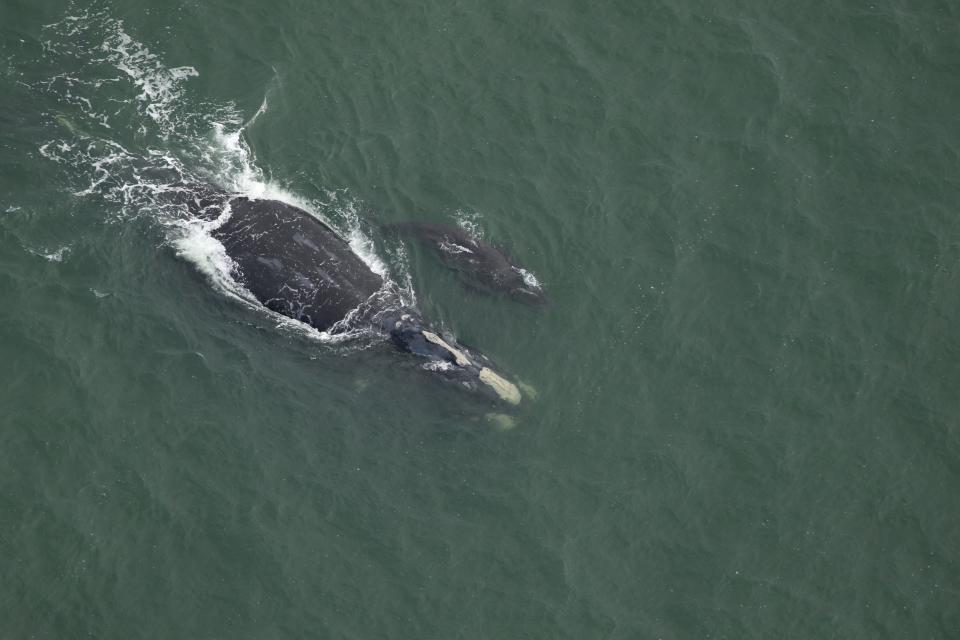First North Atlantic right whale calf of 2023-24 season spotted off SC coast
The first North Atlantic right whale mom and calf of the 2023-2024 season have been spotted off the coast of South Carolina.
Researchers from Florida’s Clearwater Marine Aquarium Research Institute discovered the pair about six miles east of Beaufort during a daily monitoring flight. They identified the mother as Juno, who is estimated to be 38 years old.
It is Juno’s eighth documented birth, according to CMARI.
Seven right whales also were observed last week in southeastern waters, including a pair of adults about seven nautical miles east of the Savannah buoy marker on Nov. 18, said CMARI North Atlantic Right Whale Conservation Project Manager Melanie White. Aerial spotters located a second adult pair about nine nautical miles off Sea Island.
"We are off to a good start with hopefully many more to come," White added.
Calf sightings in particular offer hope for experts working to restore the population, which still struggles to rebound after being nearly wiped out by commercial whalers in the late 19th century.

The right whale's name actually is a reflection of why the species is endangered. They were considered the “right” whales to hunt because they floated after they were killed. That made it easier for whalers to harvest valuable blubber from their huge haul.
North Atlantic right whales – which can live up to 70 years, reach lengths of more than 50 feet and weigh as much as 70 tons – have been protected for a half-century under the Endangered Species Act and the Marine Mammal Protection Act.
There are an estimated 360 North Atlantic right whales remaining, including fewer than 70 reproducing females.
“Every single female North Atlantic right whale and calf are vital to this species’ recovery,” the National Oceanic and Atmospheric Administration Fisheries division noted in its latest status report. “North Atlantic right whales are dying faster than they can reproduce, largely due to human causes.”
Just a dozen calves were born during the last season, according to the agency. That’s about half the annual average since the early 2000s.
“We need approximately 50 or more calves per year for many years to stop the decline and allow for recovery,” NOAA Fisheries estimated. “The only solution is to significantly reduce human-caused mortality and injuries, as well as stressors on reproduction.”
The primary threats to right whales are entanglement in fishing gear, vessel strikes and climate change, as warming ocean waters lure the plankton they feed on into new areas with fewer regulatory protections.
Each fall, some right whales travel more than 1,000 miles from feeding grounds off New England and the Canadian coast to birth their young in the shallow waters off South Carolina, Georgia and northeastern Florida.
Calving season is an especially vulnerable period for right whales. That’s why NOAA Fisheries has established seasonal management areas to protect young whales.
Beginning in November, vessels of at least 65 feet are required to maintain a speed of 10 knots (11.5 mph) or less in the designated areas to minimize the risk of collisions with calves. Ships using the Port of Savannah must navigate a protective zone that follows the coast from just north of Sapelo Island to Wilmington, North Carolina.
"It is extremely important through these seasonal management areas to provide a safe haven for mothers and calves in the only known calving ground for this species,” said James Powell, the Clearwater Marine Aquarium Research Institute's executive director.
John Deem covers climate change and the environment on the Georgia coast. He can be reached at jdeem@gannett.com.
This article originally appeared on Savannah Morning News: 2023-24's first North Atlantic right whales in waters off Ga, SC, Fla.

